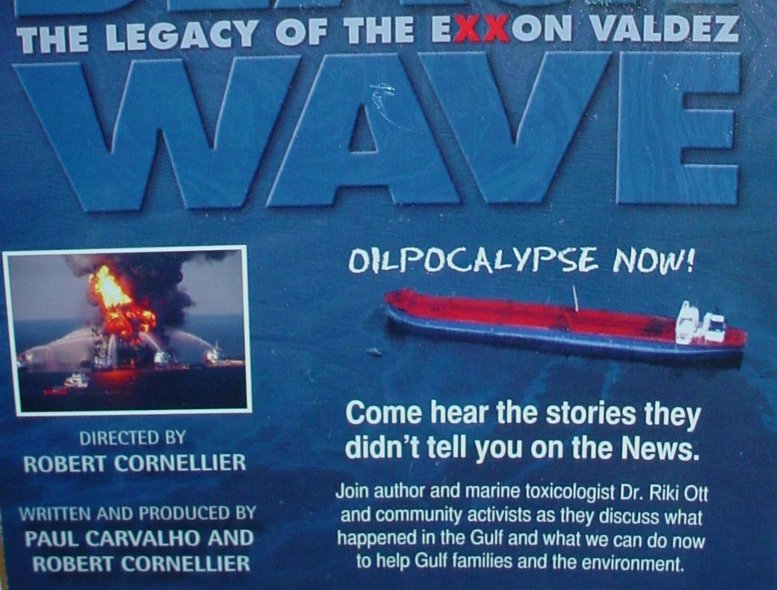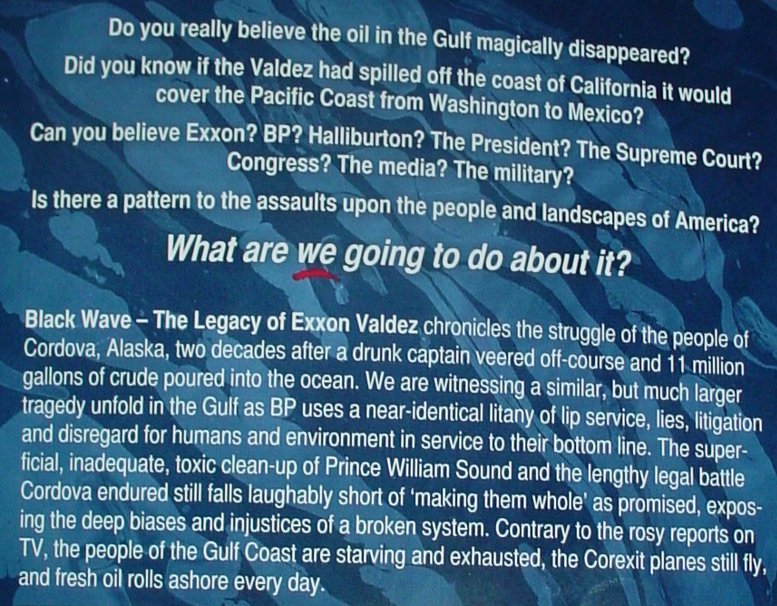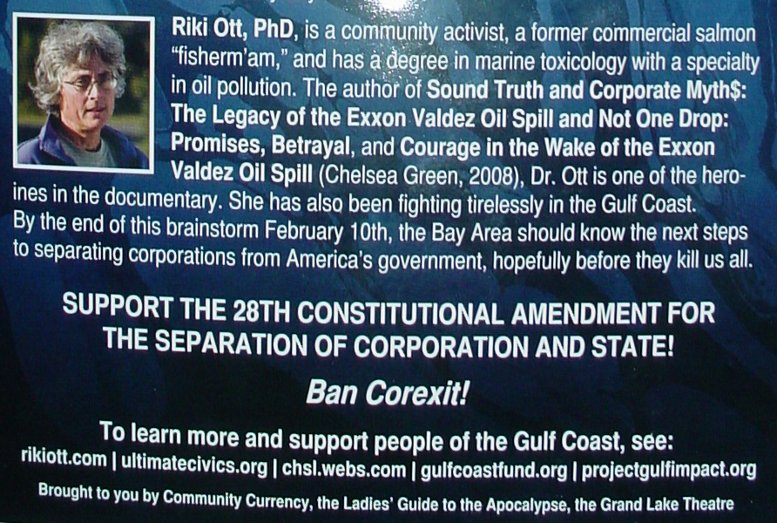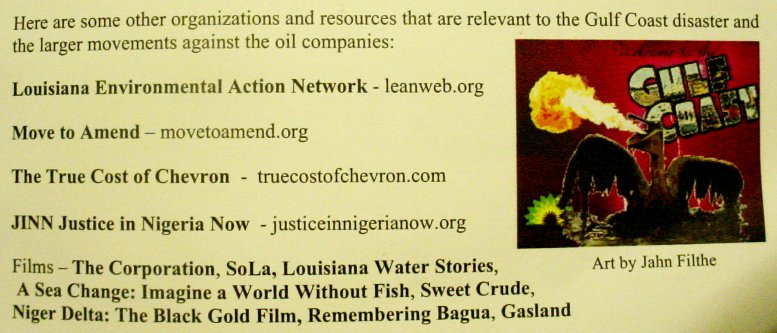I gave out about a hundred of these
things, mostly to people that were at the start of the second San
Francisco Bike Party. Every time I gave one to someone else the desire
to be there for the event got stronger in me. I ended up going up there
on Caltrain. Couldn't find a date for the event. Not a lot of people up
for being bummed out by truth.
I got there just in time for the
Tinfoil Hat Awards. There were quite a few tinfoil hat wearing people
in the crowd, but only two contestants came forward to be judged. Dick
Chaney gave each of them a prize and a heaping helping of sarcastic
arrogant bastard attitude. Then he gave the whole crowd more of the
same guff and exited stage left with middle finger held high.
Summer Burkes had an awesome tinfoil
hat. She talked about being in New Orleans for the cleanup after the
Deepwater Horizon had dumped a really huge amount of oil in her back
yard. The bad news is that she got a toxic load of some evil
chemical(s?) from the spill and cleanup soup. The other bad news is
that her car still smells of hair because of the work she did to help
Lisa Gautier. The good news was that
she is an inspiring activist and it was good to hear about her work.
She had an alter up in the lobby. I looked at it later. I'd seen parts
of it at Burning Man last summer.
Click
here
to
see
those
pictures.

Lisa Gautier had a nonprofit getting
hair salons to donate the clippings they take in and used stockings to
make booms to collect oil. She got UPS to donate the shipping to move
the hair to Louisiana. She got Legg's to donate the factory second
stockings from their factories. She got local people in the area to
donate the labor to make hair booms out of the stockings and hair. They
collected some huge warehouses full of hair boom, but they couldn't get
BP to deploy the things to contain the oil. They still have the booms
in a donated warehouse in Florida. Instead of deploying this organic
community resource, BP chose to spray millions of gallons of Corexit,
about the most toxic chemical they could find, under the Deepwater
Horizon.




Black Wave starts long before the
big soiling of Prince William Sound by the Exxon Valdez. Riki Ott came
to Cordova, Alaska on vacation and was mesmerized by the place. She'd
been a fisherm'am there for something like 7 years when the Valdez ran
aground and started spewing its toxic load. There were plenty of things
that went wrong to make the tragedy possible. Things like Exxon
promised to run double hulled tankers carrying oil from the
Trans-Alaska pipeline to refineries in California so forth.
Unfortunately, the Valdez had only one hull. This meant that when it
ran aground it cracked like an egg, spewing oil all over everything
that was anywhere nearby. In all about 11 million gallons of
the stuff entered the sound there.
Once the spill had happened Exxon started treating it like a public
relations story to manage. They started paying people to clean oil off
the rocky shore with solvents, just because that looked good on TV. A
Biologist explained that there was still a lot of oil in the ecosystem
despite that effort. They cut to footage of a cleaning boat captain
twenty years later. The guy was a ghost of the captain in the home
movies shot in '89. Every day he had to eat lots of pills from half a
dozen different bottles. He'd gotten cancer from the chemicals that
Exxon had assured him were safe. He wonders what happened to the people
he'd taken to clean beaches. Some of them probably got bigger toxic
doses then he got. He had no idea what their health problems were/are
like. He figured some were already dead.
Juries had awarded the Alaskans damaged by the spill millions of
dollars
for compensation of lost income and damages. Unfortunately, Exxon had
invested endless resources appealing the verdict to higher courts and
delaying. Compliant judges had reduced the judgment again and again.
When the Supreme Court appeal was finished the checks that came out of
the company were meager to put it mildly. There was footage of old men
with long faces burning big boxes of documents that had proven to be a
waste of due diligence. There was more talk of people that
couldn't celebrate the end of the case because they had died of cancer.
I got that "justice delayed is justice denied" feeling.
There was some illustration of how BP was doing some of the same things
in the Gulf of Mexico that Exxon had done in Prince William Sound.
There was the same veneer for the cameras, and the same drenching of
the area with toxic chemicals. The same reassuring words of comfort and
support. Time will tell if there are the same
kind of cancer clusters.

Dr. Ott spoke for a long time.
Somewhere in there she said that the guy who had been eating all the
pills in the movie had since died of his cancer. The pink salmon
fishery had recovered after only a few years, but the herring fishery
is still in deep trouble. A lot of her words
boiled down to "we need to leave that fuelish lifestyle behind." She is
excited by how many of the youth she meets get it.
Somewhere in there
somebody gave me this flier:
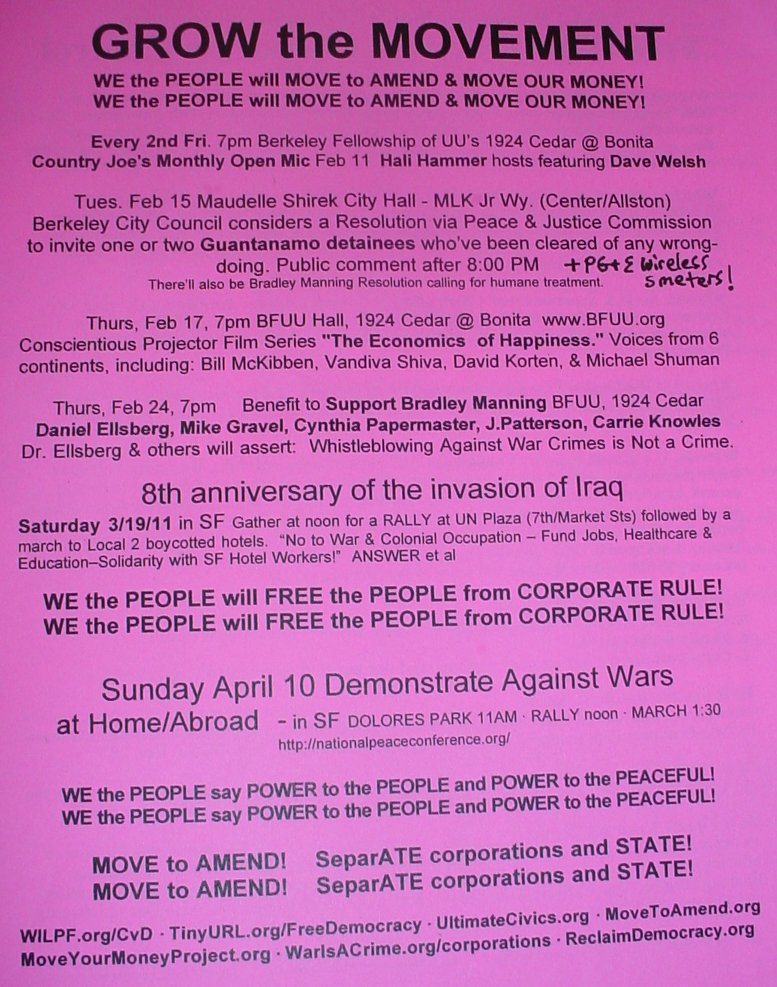

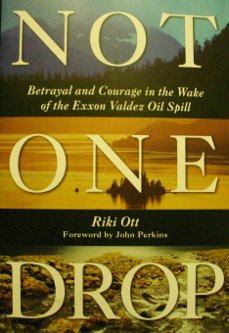
Somebody else gave me
that "It's Easy Being Green" book. She billed it as the perfect book to
browse while sitting on the toilet. Lots of interesting tidbits and
helpful suggestions. A pleasure to open at random and browse for a few
minutes. If you want my copy, let me know where to send it.
I'm looking forward
to taking a closer look at Riki Ott's book. I got it more because I
wanted to ask her for her signature than for anything else. I'm hoping
it keeps my interest once I start reading it.
leanweb.org
MoveToAmend.org
truecostofchevron.com
justiceinnigerianow.org


